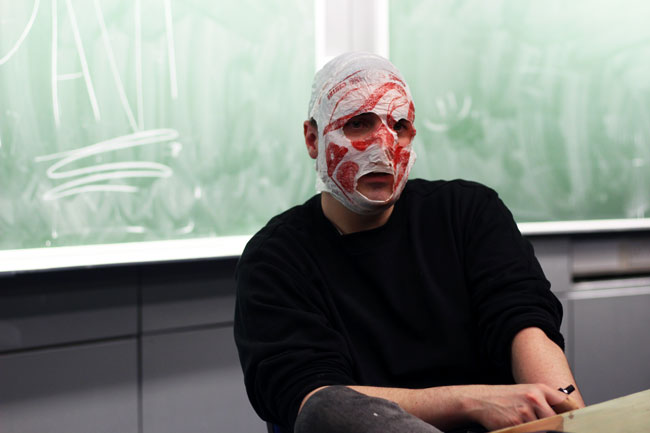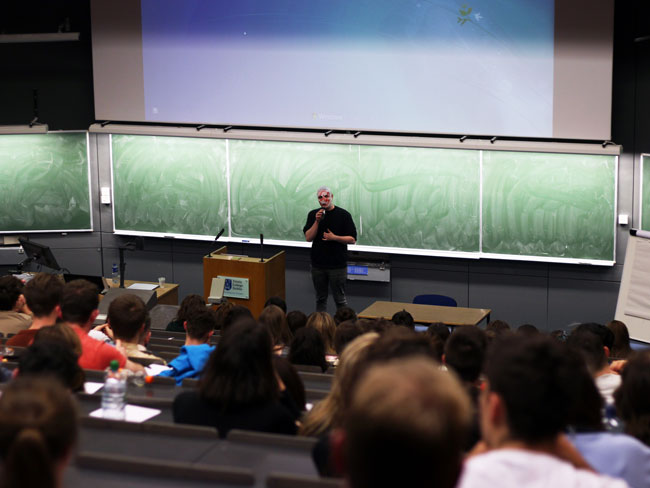
As part of Trinity College Dublin Students’ Union’s (TCDSU) Mental Health Week, last night saw Blindboy Boatclub of comedy duo the Rubberbandits gave a unique masterclass on mental health to students in the MacNeil Theatre, speaking for over an hour and a half on topics from cognitive behavioural therapy and emotional intelligence to bags of cans and prehistoric lizards.
The masterclass, organised by TCDSU, Student 2 Student (S2S), the Graduate Students’ Union (GSU), the Student Counselling Service and TCD Headspace, provided a workshop on “creative wellness and mental health”, with Boatclub delving into his own personal experiences of poor mental health and how to combat such difficulties while maintaining a lighthearted and funny approach to an often sombre and dour subject. This lack of solemnity was intentional and apparent from the outset, with Boatclub describing solemnity itself as a “bullshit thing” that does not help when it comes to mental health, serving no other purpose than “to scare the shit out of you”.
Promoting a “proactive approach”, Boatclub emphasised three ways of improving our mental health: cognitive behavioural therapy, emotional intelligence and mindfulness. Speaking of his own experiences with social anxiety and depression, Boatclub lauded the potential of cognitive behavioural therapy to improve people’s mental wellbeing, referring to it as “the best [way] to get you on the first step of the ladder” of improving your mental health.
But instead of worrying about what has happened in the past and what might happen, Boatclub spoke of how cognitive behavioural therapy can teach people to deal “with the here and now”, as it as at this time that genuine pain occurs
Not shying away from confronting reality, a characteristic evident to anyone who keeps an eye on his public appearances and art, Boatclub declared that there is “inevitable pain and disappointment” in life. But instead of worrying about what has happened in the past and what might happen, Boatclub spoke of how cognitive behavioural therapy can teach people to deal “with the here and now”, as it as at this time that genuine pain occurs.
Stating that students are preconditioned to drift off once they see powerpoint presentations, Boatclub opted instead to use a traditional marker and canvass to illustrate his points on how cognitive behavioural therapy can help to better understand your emotions, adapt your thoughts accordingly and therefore change your behaviour for the better. Of course, it being Blindboy, this was done with the aid of a diagram of Homer Simpson’s head along with a three-dimensional yoke, accompanied by some dodgy impressions of various characters and references to “Christy the Clown”.
It certainly seemed like Boatclub knew his audience, using analogies such as being “snobbed” in the canteen by your friend Aoife, dealing with the stresses of exams and choosing career and course options to deal with the emotions of anger, depression and anxiety. Describing these three as “negative emotions”, Boatclub offered the alternative feelings of annoyance, sadness and concern as ways to react positively to external events, adopting “flexible and preferential” emotions and feelings as a result.
Boatclub’s knowledge of the subject was clear to see throughout, particularly when speaking about the “amygdala” – nuclei in the brain that process emotion. After ignoring the correct pronunciation of the word from the psychology students in attendance, Boatclub spoke of the flight-or-fight response of the amygdala when speaking about panic attacks, referring to its origins in prehistoric lizards emerging from the “primordial soup” who would benefit from “shitting themselves” as it would make running away easier – a tactic that serves modern humans no purpose but is still evident when panic attacks occur, according to Boatclub.
Rather than just sticking to theory, Boatclub talked about ways to use cognitive behavioural therapy and other mental health aids, in conjunction with therapy. Drawing out an example of an “ABC form” – a grid to be used like a journal as part of cognitive behavioural therapy – which can help train people over time to acknowledge their personal beliefs about events and analyse why that is the case. Likening it to forging your own path through a field that becomes easier to traverse the more you do it, Boatclub repeatedly made reference to how such therapeutic measures have helped him and why he wants to help others as a result.
Boatclub stated that mental health issues pertaining specifically to men boil down to the patriarchy and the expectations placed on men to be breadwinners, not to cry and only show emotion through anger and assertion
Between puffs on his vape, Boatclub then fielded questions from the floor, covering the issues of men’s mental health, the double-edged sword of online-therapy and how to develop a wider conversation on the topic throughout both college and wider society. Reiterating a point he had made in an interview on The Late Late Show that went viral, Boatclub stated that mental health issues pertaining specifically to men boil down to the patriarchy and the expectations placed on men to be breadwinners, not to cry and only show emotion through anger and assertion. Speaking about feminism and the often angry reaction to some of its more outspoken and combative proponents, Boatclub said that “10 per cent of anything is going to be gowls” and that these “assholes” do a disservice to whatever cause they promote, whether it be feminism, a particular religion or anything.
Finishing off his masterclass by talking about starting a conversation on mental health, Boatclub emphasised a “pass it on” mentality where those who have gotten help will tell people of its benefits, who will then avail of therapy and continue the cycle of spreading the word. Of course, not to let an evening pass without a scathing admonition of Ireland’s history, Boatclub rhetorically asked “why the fuck weren’t we taught that at three years of age? … If they can teach us about haunted bread, they can teach us about that”.
After an evening of psychoanalysis, anecdotes about empathising with nettles and a couple tenuous tennis metaphors, Boatclub sat down with The University Times to discuss his appeal to among young people as well as topics including the alt-right, student activism and his now-infamous creation, the “trout of no craic”.
Discussing why he thinks that young people have often engaged so positively with what he has to say, Boatclub again credits his lack of solemnity. According to him, topics such as mental health are traditionally spoken about in a “very serious fashion” which can scare people, whereas Boatclub prefers to “strip all solemnity” away from the conversation and speak about such issues in “accessible”, “humourous” ways, all while maintaining the crucial appearance that he knows what he is talking about. “But at the same time, it’s clear that I’m knowledgeable and I care about it and that’s what people connect with. Do I believe that they give a shit and do they appear to know what they’re talking about? Once you’ve got that sorted, you can do it with a giant langer on your head … or a bag.”

Referring back to what he called “alt-right shitlords”, Boatclub revealed his “unpopular opinion” on how to deal with members of the “alt-right”: listening to them and disagreeing with them, but not reacting to or labelling them. Confrontational reactions are, for Boatclub, fodder for members of the alt-right and when they are “shut down or non-platformed or labeled as X, Y and Z, that actually fuels them”. Boatclub stressed the importance of the “ simple rules of debate” in these circumstances and not respond in kind with angry reactions as they see themselves as “reacting to what they see as ‘SJWs’”: “Debate, don’t shut them down, debate them. Online, don’t label them, don’t immediately scream ‘Racist! Racist!’ Try and actually debate them”.
Having addressed the crowd of protesters at last October’s March for Education, Boatclub says that student engagement in political issues is “essential” as it “bulletproofs them for when they get out of college and they’re voters”. Not only this, but politicians will “automatically be more accountable and more aware of their actions” if their constituents are politically engaged, according to Boatclub.
“What’s the point in having a students’ union that is vehemently towards a united Ireland when there may be students who are unionists?”
When asked for his thoughts on whether or not students’ unions should engage in national political affairs in light of recent campaigns across Irish campuses to adopt a pro-Irish unification stance, Boatclub says that, for him, he feels that the role of a students’ union is to “represent the interests of every student there”: “What’s the point in having a students’ union that is vehemently towards a united Ireland when there may be students who are unionists?”
For Boatclub, it is “wiser” to have a governing body for students to be impartial, and not just on the matter or Irish reunification. On the matter of students’ unions adopting a repeal the eighth stance, a position he himself supports, Boatclub again feels that students’ unions should not venture down such political avenues, instead suggesting that college societies with particular agendas on either side of each issue be set up so as to not have a union that does not represent each of its members: “I just don’t see the point in it – you’re excluding people and they’re entitled to their beliefs, even though I strongly disagree with those beliefs.”
Before finishing up, Boatclub responded to questions on the content released by The Rubberbandits, particularly on his creation “The Trout of No Craic”, the Salmon of Knowledge’s brother. Boatclub loves his creation, as the trout gives him the opportunity to “vent really stupid, ridiculous shit that no longer sounds appropriate in Blindboy’s voice” as The Rubberbandits have become more socially conscious and are taken more seriously by the public. “The trout of no craic, he would be against repeal the eighth on the grounds that he hates feminists, he would be pro-Donald Trump. He is just lads that I know that I disagree with that are good craic, but don’t have a chat about politics with them.”
From chatting to Boatclub, it becomes evidently clear that his attitude towards mental health is one that is refreshing and highly accessible. As TCDSU’s Mental Health Week draws to a close, this attitude is definitely one that we should be inspired to take forward to our own encounters with mental health struggles, both as students and later in life.






